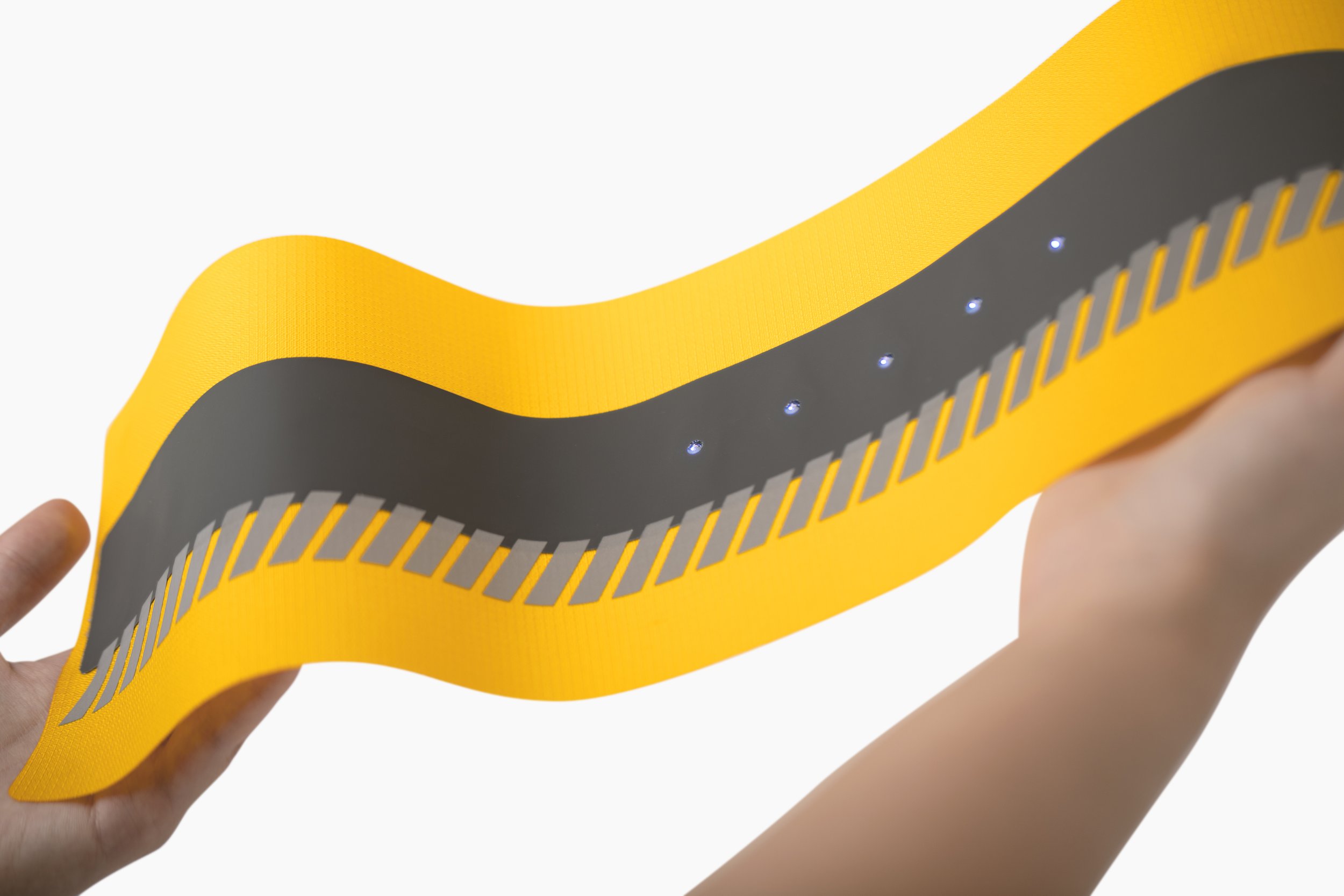
Heated Fabric: A New Way for Automotive Innovation
The demand for energy-efficient, sustainable, and luxurious automotive interiors has never been higher. Heated fabric technology is stepping up to meet these needs, offering not just comfort but also efficiency for modern vehicles.
Introducing the Gentoo Textile Heater–Reliable Performance for Ultra-Cold Environments
Engineered to perform in ultra-cold environments, the Gentoo Flexible Heater is a thermoplastic polyurethane (TPU)-based resistive heater that maintains optimal performance even at temperatures as low as -60°C. Designed for seamless integration into textiles, this heater combines comfort, breathability, and stretchability with reliability in extreme conditions. When laminated to a textile, this heating element makes a robust heating fabric.
Exploring Force Sensitive Resistors: The Future of Pressure Sensing
Force sensitive resistors (FSRs) have become a vital technology for pressure sensing in today’s tech-driven world. Their versatility and effectiveness make them an excellent choice for industries ranging from robotics to healthcare. But what exactly sets FSRs apart from other pressure sensing technologies?
Custom Flexible Heater: Precision Thermal Solutions for Modern Applications
In the world of electronics and advanced systems, maintaining optimal temperatures is critical for performance, reliability, and safety. Custom flexible heaters have emerged as a cutting-edge solution for industries demanding precise and efficient heating in challenging environments.
Transitioning into the Winter Season in Automotive with Loomia's Heating Technologies
As winter approaches, drivers everywhere prepare for the challenges that cold weather brings. Frosty mornings and chilly car interiors can make commutes uncomfortable, and traditional vehicle heating systems often take time to warm up. Loomia's innovative heating technologies offer a groundbreaking solution, seamlessly integrating advanced heating elements into automotive interiors to enhance comfort and efficiency during the colder months.
The Role of Flexible Electronics in Robotics
As the field of robotics continues to advance, the integration of flexible electronics is playing a pivotal role in shaping the future of robotic technologies. From enhancing the adaptability of robotic limbs to enabling more intuitive human-robot interactions, flexible electronics are revolutionizing how robots function and interact with their environment.
Optimizing Athletic Performance with E-Textiles
The fusion of technology and sports has opened new frontiers in athletic performance optimization. E-textiles, or electronic textiles, are at the forefront of this revolution, offering innovative solutions to enhance training, prevent injuries, and elevate overall athletic performance.
LOOMIA Awarded Competitive Grant from the U.S. National Science Foundation
Loomia, with their flexible electric circuit technology designed to integrate seamlessly with textiles, has been providing innovative vehicle solutions that enhance safety, comfort, and sustainability. Built on over a decade of engineering research in flexible electronics, Loomia’s e-textile technology creates durable, drapable, and soft electronic layers applicable across various sectors like automotive. Loomia developed its groundbreaking steering wheel project as a better alternative to the traditional electronic components used in vehicles that are becoming increasingly outdated, leading to inefficiencies, higher costs, and environmental concerns.
Electronic Clothes and Data Security: Safeguarding Privacy in the World of Smart Textiles
In the rapidly evolving landscape of wearable technology, electronic clothes are emerging as a revolutionary fusion of fashion and function. As these smart textiles become more integrated into our daily lives, it's essential to address the critical aspect of data security to protect user privacy.
Loomia and Yanfeng Announce a Strategic Automotive Collaboration
Yanfeng, a global automotive supplier known for their interior solutions, and Loomia, a leader in electronic textiles and flexible electronics, have announced a strategic partnership.
How E-Textiles and Flexible Electronics Are Changing Automotive Interior Designs
Next-generation vehicles will feature smart cabins with seamless integration of advanced technologies that enhance connectivity and user experience. E-textiles and flexible electronics are central to this transformation, as they are expanding beyond their traditional boundaries and entering into big industries like automotive.
An Intelligent Way to Touch: Smart Surfaces
In the dynamic world of technology, innovation never ceases. One of the most exciting advancements in recent years is the development of smart surfaces. These cutting-edge materials are changing the way we interact with our environments, blending functionality with design in ways previously unimaginable.
The Environmental Impact of Smart Textiles
In an era where sustainability is more important than ever, the textile industry is undergoing a significant transformation. Smart textiles are at the forefront of this change, offering innovative solutions that not only enhance functionality but also contribute to environmental sustainability.
A New Era for Automotive Comfort with Smart Textiles
In the automotive industry, comfort and functionality are paramount. Smart textiles are paving the way for a new era of automotive interiors, offering innovative solutions that enhance both driver and passenger experiences. At Loomia, we are at the forefront of this revolution, integrating advanced technologies into automotive interiors to create safer, more comfortable, and energy-efficient vehicles.
Loomia: Where Imagination Meets Innovation
In the innovative world of advanced materials, Loomia stands out as a transformative force with its the Loomia Electronic Layer (LEL). This technology is not just a component; it’s a creative revolution, empowering designers and engineers to bring their visions to life with unparalleled flexibility and functionality.
The LEL vs. Conductive Fabrics
The fusion of textiles and technology has birthed conductive fabrics, a groundbreaking innovation that is electrifying the fabric of modern life. These materials are designed to conduct electricity, paving the way for the next generation of flexible electronics.
Design Your Own Soft, Flexible Electronics: The LEL Builder
In the dynamic world of design and engineering, the Loomia Electronic Layer (LEL) stands as a beacon of innovation, redefining the essence of flexible electronics. This transformative technology is not just a component; it’s a creative revolution, empowering designers and engineers to bring their visions to life with unparalleled flexibility and functionality.
Heating Up Innovation: The Loomia Electronic Layer (LEL) and the 12V Heater
In the innovative landscape of advanced materials, the Loomia Electronic Layer (LEL) emerges as a transformative force, particularly with its application in creating flexible heaters. This technology is not just about bending the rules; it’s about reshaping them entirely.




















